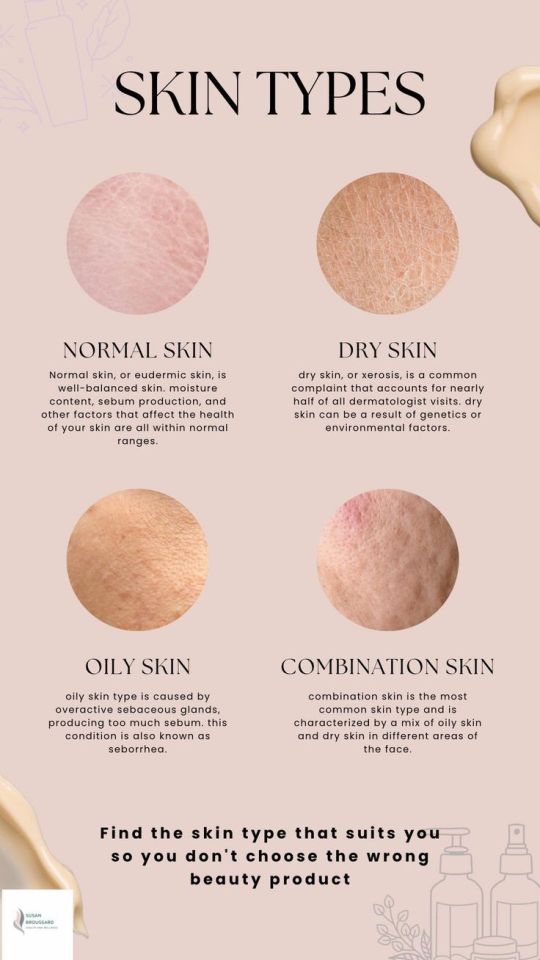Don't wanna be here? Send us removal request.
Text
Identifying Your Skin Type
Here’s a quick guide to help you identify your unique skin type so that you can give it the care and attention it needs.
Knowing your skin type is the most important step in achieving healthy, glowing skin at any age. Identifying your individual skin type can help you choose the right products and treatments to make sure that your skin looks its best.

Normal Skin Types: Normal skin types generally have an even balance of oil and moisture, with a smooth texture and few visible pores or blemishes. If you have normal skin, you should use a gentle cleanser, light moisturizer, and SPF protection every day to keep your complexion looking its best.
Oily Skin Types: If your face feels greasy after washing it or if you experience frequent breakouts, then it’s likely that you have oily skin. To keep oiliness under control, look for ingredients like salicylic acid, retinol, and clay-based masks in your skincare routine. Make sure to cleanse twice daily with an oil-free product and apply a lightweight moisturizer with SPF protection when needed.
Dry Skin Types: If your face feels tight after washing it or if it often appears flaky or irritated then there’s a good chance that you have dry skin. When choosing skincare products for dry skin types, look for ingredients such as hyaluronic acid which helps draw moisture into the deeper layers of the epidermis (the outermost layer of the skin).
You should also avoid cleansing too frequently as this can strip away natural oils which are essential for keeping dryness at bay. Look for heavier creams or ointments in place of lotions and serums; these products provide extra hydration while still absorbing quickly into the skin without leaving behind residue or a greasy feel. Finally, always use an SPF 30 or higher daily to protect against sun damage which could further worsen dryness over time.
Characteristics of Sensitive Skin:
Redness: Sensitive skin may exhibit redness, especially in response to environmental triggers or skincare products.
Irritation: Sensitive skin is easily irritated by various factors, including harsh ingredients, fragrances, and weather conditions.
Tightness: Sensitive skin often feels tight or uncomfortable, particularly after cleansing or exposure to irritants.
Dryness: Sensitive skin can be prone to dryness and flakiness, especially if not properly moisturized.
Allergies: Individuals with sensitive skin may be more prone to allergic reactions, such as rashes or hives, when exposed to certain substances.
Tips for Caring for Sensitive Skin:
Use Gentle Products: Opt for skincare products specifically formulated for sensitive skin, free of harsh ingredients like fragrances, alcohol, and sulfates.
Patch Test: Before applying new skincare products to your face, perform a patch test on a small area of skin to check for any adverse reactions.
Avoid Over-Exfoliation: Limit the use of exfoliating products, as they can exacerbate sensitivity. Opt for gentle exfoliants and use them sparingly.
Moisturize Regularly: Keep your skin hydrated with a gentle, fragrance-free moisturizer suitable for sensitive skin. Apply moisturizer immediately after cleansing to lock in hydration.
Protect from Sun Exposure: Shield your skin from the sun's harmful UV rays by wearing sunscreen daily. Choose a broad-spectrum sunscreen with SPF 30 or higher and reapply regularly, especially if spending time outdoors.
Practice Gentle Cleansing: Cleanse your skin with a mild, non-foaming cleanser that effectively removes impurities without stripping away natural oils. Avoid hot water and harsh scrubbing, which can further irritate sensitive skin.
Be Mindful of Environmental Triggers: Minimize exposure to environmental factors that can trigger sensitivity, such as extreme temperatures, pollution, and harsh weather conditions.
Manage Stress: Stress can exacerbate skin sensitivity, so incorporate stress-relieving practices like meditation, yoga, or deep breathing exercises into your daily routine.
Consult a Dermatologist: If you're struggling to manage sensitive skin or experiencing persistent irritation, consult a dermatologist for personalized advice and treatment options.
By following these tips and adopting a gentle skincare routine tailored to sensitive skin, you can help soothe irritation, reduce redness, and promote a healthier, more comfortable complexion.

Once you know what type of skin you have, it will be much easier to find effective products and treatments tailored specifically for your needs—but don’t forget about lifestyle changes too! Eating healthy foods rich in omega-3 fatty acids like fish oil supplements can help boost overall health from within; getting enough sleep; drinking plenty of water; taking regular breaks from technology; exercising regularly; and finding ways to reduce stress are all key components to any successful skincare routine regardless of age or skin type!
1 note
·
View note